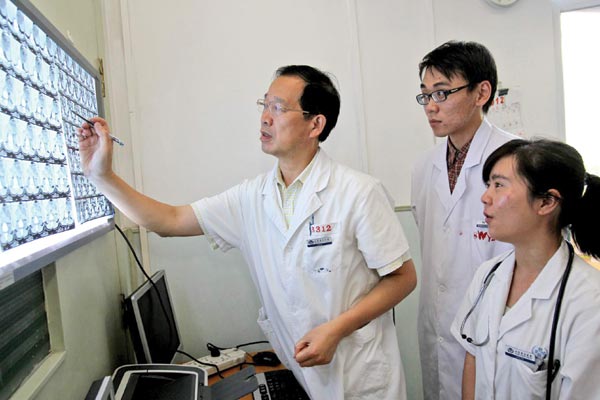Doctor puts his heart into hypertension discoveries
 |
|
Hypertension specialist Yu Zhenqiu offers guidance to young doctors about a case study at the Beijing Anzhen Hospital. Jiang Dong / China Daily |
Yu Zhenqiu is the reason hypertension is a separate discipline from cardiology in China - and in the world.
The 56-year-old hypertension specialist decided to devote his energy to the disease more than 20 years ago, when he was a fresh graduate from No 4 Medical University, the best of its kind in the country.
When he started working at the Beijing Anzhen Hospital, hypertension research and treatment still fell under the cardiology umbrella.
His push to separate the two was partly inspired by a woman he treated, who had suffered months of palpitations and dizziness, but none of the tests found any problems. Nobody had a clue what was wrong with her.
But Yu had a hunch the culprit was high blood pressure. He was right. And the doctor found multitudes of patients in the same boat.
"Hypertension is a very serious medical problem that deserves more attention than it was getting," he says.
Few laypeople knew the disease's symptoms or risks in the 1990s. Consequently, many who were diagnosed ignored doctors' orders.
While 12 percent of Chinese suffered from the disease in the '90s, only 3 percent of the cases were under control, he explains.
And high blood pressure was then considered a symptom, rather than a disease, worldwide.
"I saw the harm hypertension was causing and felt I must do something about it," Yu recalls.
So, he began his campaign to separate hypertension from cardiology. He and a colleague organized experts to compile a tome that detailed causes, diagnoses, treatments and preventions. They also examined high blood pressure's relationships with other diseases.
Practical Hypertensionology was published in October 1993.
"It was the world's first book to separate hypertension and cardiology studies," Yu says.
"I created the term 'hypertensionology' to make the distinction."
The book was a multi-edition success and has become a standard textbook for medical students.
Yu and Beijing Anzhen Hospital's then president Zhang Zhaoguang founded the hospital's hypertension department in 2003.
The doctor uses his growing influence to advocate the establishment of comparable departments in other hospitals. And he offers assistance to those that do. He has helped thousands of doctors become specialists in the disease.
"China has a very large population with hypertension," Yu says.
It's 18.8 percent of the country's 1.3 billion people. Most don't know they have the disease because it's often asymptomatic. And only 6.1 percent of patients have the disease under control, Yu explains.
"It's vital to ensure there are enough specialists to treat them," Yu says.
He hopes China will soon host the world's first international hypertensionology conference.
"It's equally important to cultivate professionals and raise public awareness," he says.
The doctor has been hosting free question-and-answer sessions after his shifts at Anzhen since 1994.
Beijing's government recently named him among the first group of officially recognized popular science lecturers. Yu also frequently appears on TV programs about health.
"TV is a powerful medium for promoting health awareness," Yu says.
Yu's patient list has grown with his profile.
In 2008, 54-year-old Beijinger Wang Lizhi was diagnosed with severe heart disease after a heart attack caused by low potassium, followed by more cardiac arrests the next year.
He saw Yu speaking about hypertension's relationship with hypokalemia on TV in 2009.
Wang visited Yu, who examined him and determined the cause of his heart attacks was primary aldosteronism, a kidney disease that can be lethal if not treated in time.
"Dr Yu saved me," Wang says.
liuzhihua@chinadaily.com.cn
















